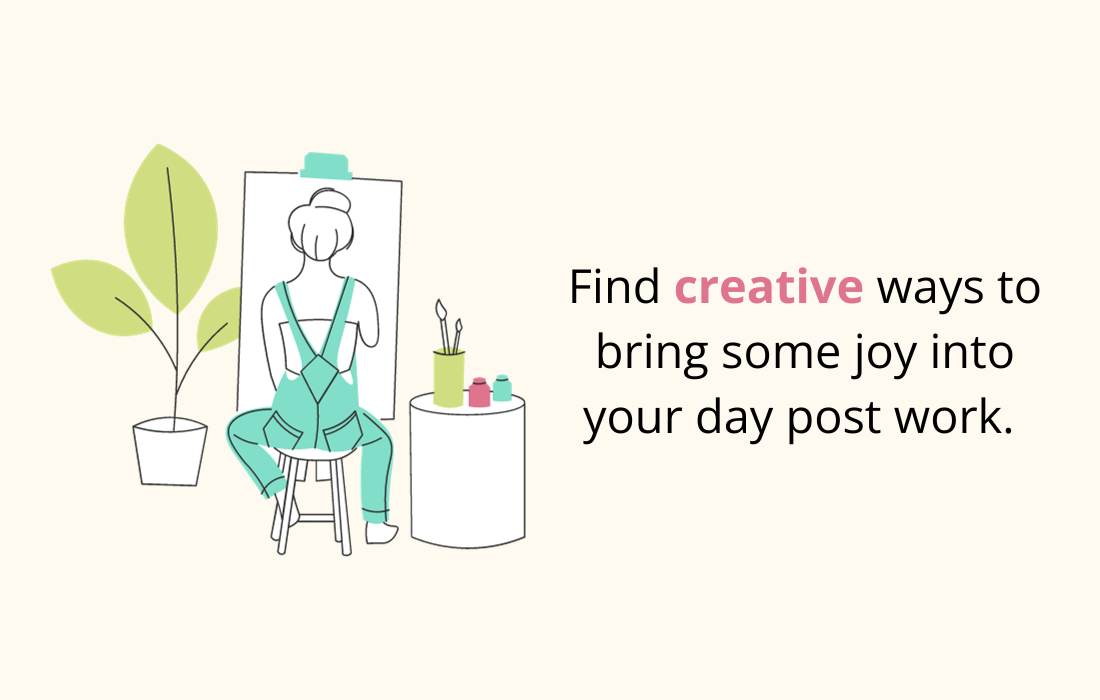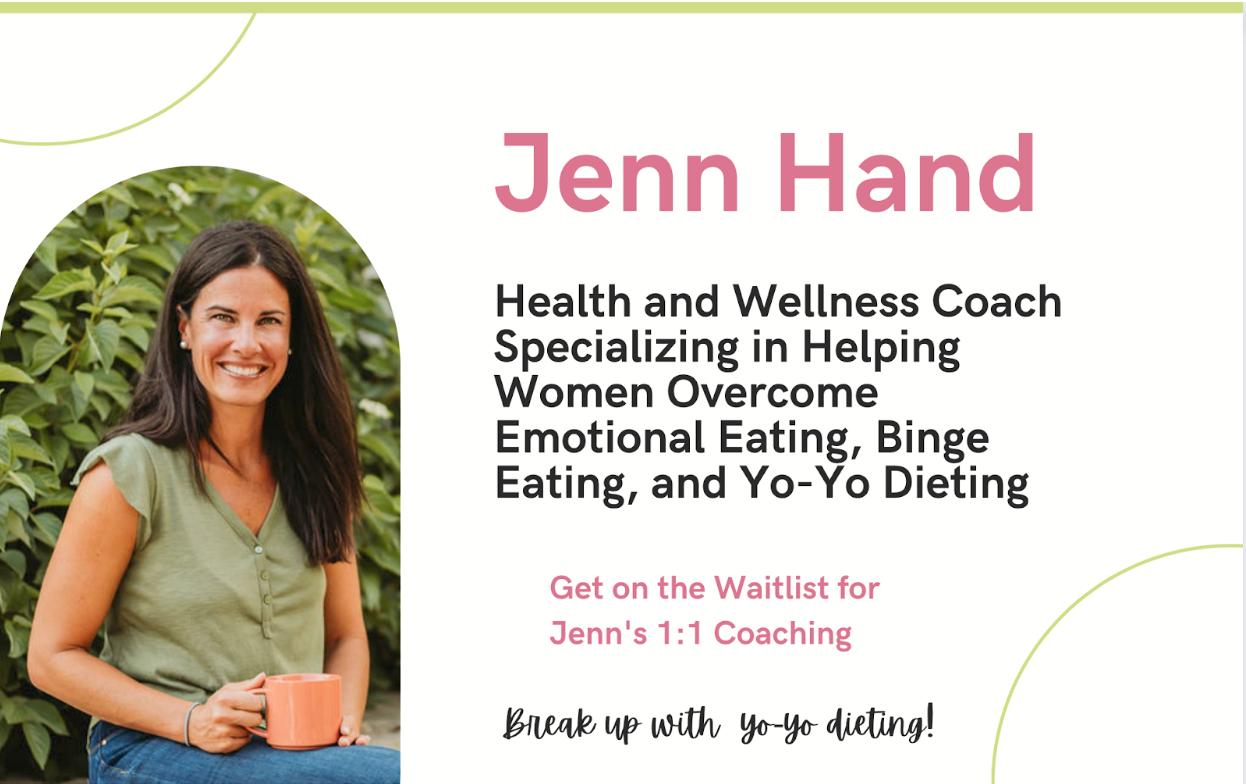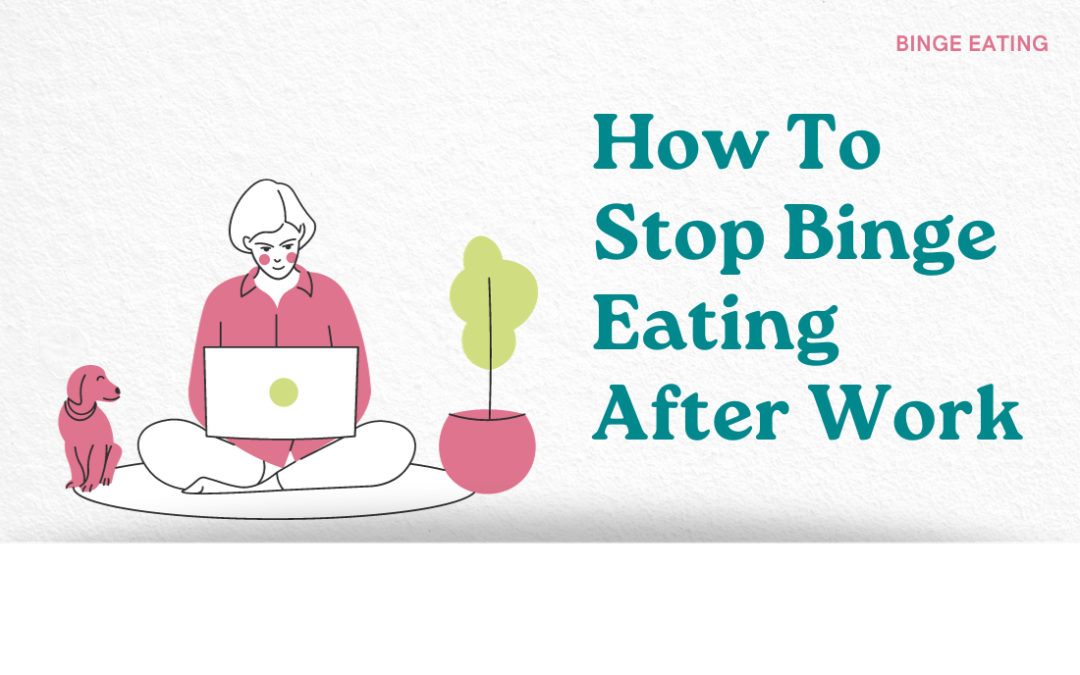If you struggle to stop snacking once you get home from work (or once your laptop is closed as a remote worker), here are 5 tips to help!
Written by Jenn Hand, Holistic Nutritionist, Board Certified Health Coach, NBC-HWC, Binge Eating Coach
5 Tips to Help You Stop Binge Eating
These tips are all things that will actually help you overcome the post-work binge. If you want more detailed information, read my blog about how I stopped binge eating.
1. Make sure you eat enough during the day
When we don’t get enough fuel into our bodies during the day, it causes our body to run on empty.
Our blood sugar is low and we want an instant hit of fuel–which is usually sugar or starchy carbohydrates, as these are the fastest to digest.
If we’re busy at work–answering emails, tied up in meetings, teaching a classroom of students, running around treating patients–we may not be eating at regular times, if at all.
Take a look at your schedule to see where you can slot in a few times during the day to pause and take a break. The pause can be quick, but it’s important to take some time to make sure your blood sugar stays even during the day so you don’t crash post work!
2. Work to process any emotions you’re carrying from work
Emotionally, we may be carrying feelings that we keep pent up from work interactions.
We may get irritated at a co-worker, frustrated with our boss, angry at our workload, or feel bored when we don’t have enough to do. This can cause us to turn to food to soothe these feelings, as we may not know how to vent or process them.
Explore ways to process and let your emotions go. Maybe it’s journaling or breathwork. Perhaps it’s calling a friend or family member to vent. It even could be a calming bubble bath to help recenter you. Whatever it is, work to let go of any built up work emotions!
3. Create a post-work transition
I used to come home from work, put my purse on the table and immediately walk to the pantry to peruse what was inside.
When I started working to create a different habit, I put my purse on the table, changed out of my work clothes, made a cup of tea and read a chapter of a book on my couch.
Remote work transitions may look different, but they are still important.
See if you can create some ritual to help you transition from your work day into your evening and home life. You could try journaling, a walk, playing with a child or pet, a quick game on your phone, or anything else that feels nourishing!
4. Plan dinner in advance
This can be a super helpful, practical tip to help combat post-work snacking.
When we plan ahead for dinner and have the ingredients on hand, it helps to give us a focus after work.
We aren’t wandering aimlessly around the kitchen wondering what to make for dinner. If we go into the day having an idea of what and when we’ll eat, it can help keep us balanced throughout the day.
5. Create something to look forward to
Sometimes food can be a thrill. It feels exciting, like a reward for a long day.
What other things can we look forward to so that we don’t need food to fill that role? Maybe it’s an addicting TV show to watch. Or a craft night with some friends (or yourself.) It could be a new recipe you’ll try. Brainstorm to find creative ways to bring some joy into your day post work.

Common Questions about Binge Eating and Emotional Eating After Work
Why do I eat a lot after work?
These are the two biggest reasons we eat after work:
1) We don’t eat enough during the day as we’re tied up in meetings and projects.
2) We carry emotions from the day into post-work snacking.
Why am I so hungry after working hard?
Strong hunger can be a result of different things: stress, lack of protein and fat, undereating during the day, intense exercise or focus, and seasonal changes.
Explore if your hunger is physical, mental or emotional to be able to best address it.
How do I train my body to stop snacking?
A part of working to find balance in your eating is to honor your body’s hunger.
If you’re feeling hungry, have a snack.
If you’re eating for any other reason, explore the emotional or habitual causes behind the desire for food to help you find balance.
How do I train my mind to stop snacking?
Mind hunger is a real thing! We may see snacks and simply want it because they taste good or are there.
It can help to do some deep breathing exercises to get in touch with WHY you want the food. Are you hungry?
Do you want something to soothe you emotionally? Is there overwhelm or stress? Is it simply a habit? Get curious to look at what’s behind the desire.
Read More:
🌷The Binge and Restrict Cycle and How I Overcame It
🌷Recovering from Binge Eating: What to Do and How to Feel Better
🌷I Stopped Binge Eating. Here’s How I Did It.
Work with a Emotional Eating & Holistic Nutrition Coach
Overcome Bingeing and Emotional Eating, and Break Up with Yo-yo Dieting
Working with a binge eating coach and holistic nutritionist can help you get free from the frustrating binge and restrict cycle and stop yo-yo dieting.
You don’t have to be obsessed with food or have a million rules around eating to find your natural weight and learn to love your body. Ready to actually see a lasting change and experience true freedom?
Schedule a 20-min CallAbout the Author:

Jenn Hand has been helping women like you become normal eaters since 2015.
She’s worked with thousands of women, helping them to balance their bodies, end bingeing, stop obsessing over food, and start feeling amazing again. As a board-certified health coach and holistic nutritionist, Jenn knows how to support you in making real positive changes that last.
Her articles have been published on Mind Body Green, Tiny Buddha, Thrive Global and other local and global media platforms. She’s the author of How to Be a Normal Eater and the creator of The Normal Eater’s Club program. Listen to Jenn’s advice and tips on the Cake Doesn’t Count Podcast, or read more of her articles for free on the Food Freedom Blog.
Learn About Coaching!




